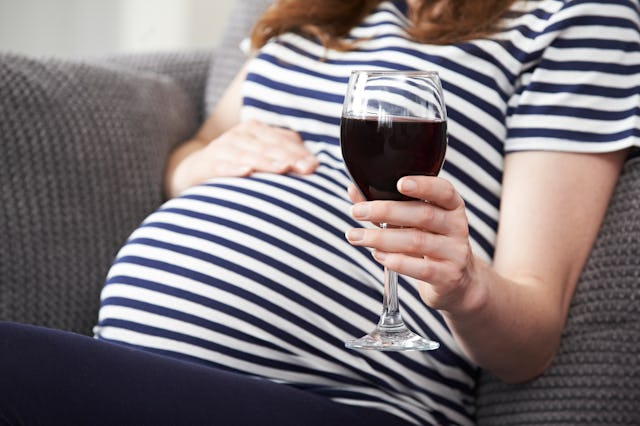Don’t Judge Me For Having That Glass Of Wine While Pregnant

The moment a woman announces to the world that she is expecting, she apparently becomes public property. People say rude things to her like, “Did you mean to get pregnant?” They ask her inappropriate personal questions like, “Are you going to have a natural birth or schedule it?” And they even have the gall to arrogantly make decisions for her like, “Oh, you can’t eat that while pregnant. I read about that online.” It is this last point that especially chaps my hide.
Guess what? I’m a full-grown adult with an advanced degree in motherhood. I think I can handle eating or drinking whatever I want without the public rubbernecking and making sanctimonious commentary on it. Some women will eat their brie and blue cheese throughout pregnancy. Others will refuse to give up deli meat, and they end up with perfectly healthy babies too. With all the strict rules that leave no room for gray areas, it is time that we give women a little bit more benefit of the doubt when it comes to the health and safety of their pregnancies.
For example, if I choose to have a glass of red wine while pregnant, then I will have one. Note that I did not say a bottle of wine or a cask. I said glass. Women all over the world have been relishing an occasional glass of red while expecting for eons without harming their growing babies. And despite what the legions of overly opinionated strangers armed with misinformation on the internet will tell you, there is plenty of research to back up the fact that a few glasses of wine spread throughout a pregnancy is absolutely no big deal.
The American Congress of Obstetricians and Gynecologists (ACOG) has a zero tolerance policy when it comes to alcohol during pregnancy, but the fact is there is simply no evidence that occasional light drinking — I’m talking one glass of wine here or there — is dangerous to a growing fetus.
According to Emily Oster, an associate professor of economics at Brown University and author of Expecting Better: Why the Conventional Pregnancy Wisdom Is Wrong-and What You Really Need to Know:
The bottom line is that while there is clear evidence of the dangers of heavy drinking — especially binge drinking — in pregnancy, the same cannot be said for low levels of alcohol consumption. As even the AAP report acknowledges, there is consensus on this issue. A large share of OBs in the U.S. report telling their pregnant patients that some alcohol is fine.
We have come to a bizarre place in modern parenting when we expect mothers to be 10,000% responsible for every aspect of her progeny, and yet we don’t trust her to make a single parenting decision. Just look at the way we treat breastfeeding mothers. We rail against mothers who use formula, but then shame and mock women who breastfeed their babies in view of anyone with eyeballs.
No woman should be drinking heavily while pregnant. And honestly, no person should really be drinking heavily, period. That’s just common sense. But when we collectively gang up and tell women that they aren’t allowed to make informed decisions about their own bodies, we are telling them that their voices are invalid and that no matter how they came to their decisions (informed or not), we ultimately have an innate right to veto and shame them into behaving in ways that are counterintuitive to their lives. This attitude toward women sounds a lot like bullshit to me.
This sexist and condescending attitude toward women is bullshit, people.
We need to get a to place as a culture where we can learn to trust mothers — who, by the way, are brave and bold AF — to know what is best for their families and for themselves. And so when I see a pregnant woman in a restaurant enjoying a small glass of red wine with her dinner, I won’t give her a hard time. I will raise my glass at her and congratulate her on her growing family.
And that glass I raise? It may have water in it, or it may have wine. And I’ll tell you something else: Whatever is in that glass is nobody’s damn business but mine.
[free_ebook]
This article was originally published in 2016.
This article was originally published on